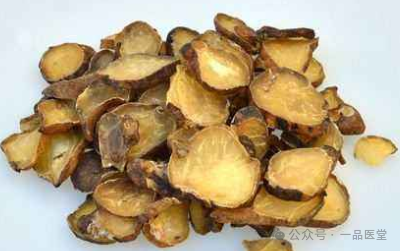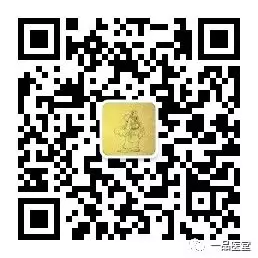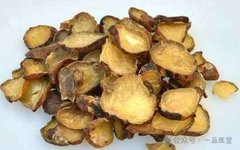
Shennong Bencao Jing: Fuzi (Aconite), taste is pungent and warm. It is indicated for wind-cold cough, counterflow of evil qi, warming the middle, traumatic injuries, breaking up masses, blood fatigue, cold dampness, spasms, and foot pain that prevents walking.
Fuzi is pungent and warm, capable of reaching both the upper and lower parts of the body, able to ascend and descend, and can treat both exterior and interior conditions. Wang Haogu stated: its nature is to move and not to stay, unlike Ganjiang (Dried Ginger) which stops and does not move. The reason lies in Fuzi’s ability to move and not stay, passing through the twelve meridians, reaching everywhere. Therefore, from the applications of Fuzi in the Shanghan Lun, it can be seen that Fuzi can be used for exterior syndromes, interior syndromes, and half exterior half interior syndromes. Fuzi is pungent and warm. Cold is treated with heat, thus it is used for treating deficiency-cold syndromes, such as the three yin syndromes. For Taiyin syndrome, formulas include: Ganjiang Fuzi Decoction, Sini Decoction, and Fuzi Decoction; for Shaoyin syndrome, formulas include: Guizhi Jia Fuzi Decoction, Mahuang Fuzi Gancao Decoction; for Jueyin syndrome, formulas include: Wumei Pill, etc.
The Pain of Fuzi: Limb Pain, Cold Abdominal Pain, and Joint Discomfort.
1. Dahuang Fuzi Decoction
For pain under the ribs, fever, and a tight and wiry pulse, this indicates cold, and it should be treated with warming herbs, thus Dahuang Fuzi Decoction is appropriate.
This cold and solid accumulation syndrome should be treated with warming herbs, with a larger quantity of Pao Fuzi (processed Aconite) used, typically three pieces, with pain under the ribs being a typical symptom characteristic.
2. Guizhi Fuzi Decoction, Remove Guizhi and Add Baizhu Decoction
For cold damage on the eighth or ninth day, with wind-dampness entangled, body pain and discomfort, inability to turn or lie down, no vomiting, no thirst, and a floating, weak, and rough pulse, Guizhi Fuzi Decoction is indicated; if the person has loose stools and frequent urination, Remove Guizhi and Add Baizhu Decoction is indicated. Body pain and discomfort, inability to turn or lie down (heavy pain) is a symptom of Fuzi.
3. Gancao Fuzi Decoction
For wind-dampness entangled, joint pain and discomfort, pain that cannot be flexed or extended, severe pain upon approach, sweating, shortness of breath, difficulty urinating, aversion to wind and not wanting to remove clothing, or slight swelling of the body, Gancao Fuzi Decoction is indicated.
4. Fuzi Decoction
For Shaoyin disease, if it lasts one or two days, with a harmonious mouth and aversion to cold in the back, moxibustion should be applied, Fuzi Decoction is indicated.
For Shaoyin disease, body pain, cold hands and feet, joint pain, and a deep pulse, Fuzi Decoction is indicated.
5. Guizhi Shaoyao Zhimu Decoction
For pain in all limbs and joints, body weakness, swollen feet, dizziness, shortness of breath, and a desire to vomit, Guizhi Shaoyao Zhimu Decoction is indicated.
6. Guizhi Jia Fuzi Decoction
For Taiyang disease, sweating occurs, but it does not stop, with aversion to wind, difficulty urinating, and limbs slightly urgent and difficult to flex, Guizhi Jia Fuzi Decoction is indicated.
Symptoms of Fuzi: Continuous sweating, aversion to wind without fever, limbs slightly urgent and difficult to flex.
7. Guizhi Remove Shaoyao Add Mahuang Fuzi Xixin Decoction
Corresponding symptoms: Cold hands and feet, cold body, bone pain, and aversion to cold are all symptoms of Fuzi.
8. Zhenwu Decoction
For Shaoyin disease, if it does not resolve after two or three days, and after four or five days, with abdominal pain, difficulty urinating, heavy and painful limbs, and diarrhea, this indicates the presence of water qi. The person may cough, have frequent urination, diarrhea, or vomiting, Zhenwu Decoction is indicated.
9. Fuzi Gengmi Decoction
For cold qi in the abdomen, thunder-like cutting pain, fullness in the chest and ribs, and vomiting, Fuzi Gengmi Decoction is indicated.
10. Yiyiren Fuzi Decoction
For chest obstruction and urgency, Yiyiren Fuzi San is indicated.
11. Wutou Chishizhi Pill
For heart pain radiating to the back, and back pain radiating to the heart, Wutou Chishizhi Pill is indicated.
12. Jiutong Pill
For treating nine types of heart pain.
13. Shenqi Pill
For deficiency-related lower back pain (fluid deficiency, pain syndrome).
14. Sini Decoction
For fever and headache, with a deep pulse, if not resolved, body pain occurs, Sini Decoction is indicated.
For diarrhea and abdominal distension, with body pain, first warm the interior, then attack the exterior.Warming the interior should use Sini Decoction, attacking the exterior should use Guizhi Decoction.
For profuse sweating, heat not dissipating, internal tension, limb pain, and diarrhea with aversion to cold, Sini Decoction is indicated.
For vomiting, diarrhea, sweating, fever, aversion to cold, and cold limbs, Sini Decoction is indicated.

Cold symptoms of Fuzi: aversion to cold, aversion to wind, cold hands and feet, cold extremities, and shivering.
Shenqi Pill treats distension syndrome.

